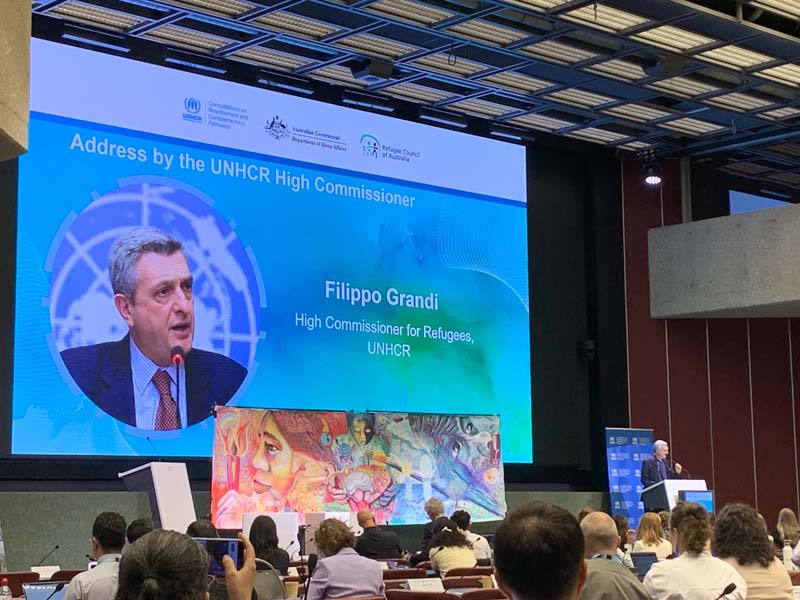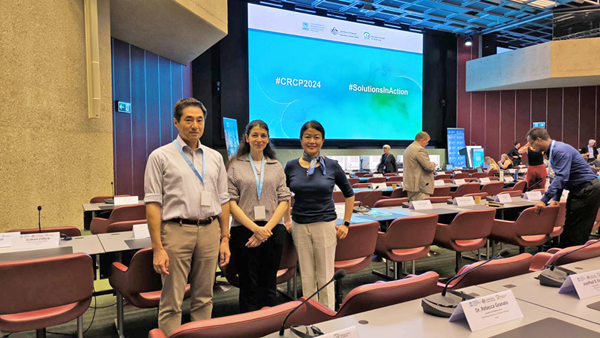JICUF Participates in UNHCR Annual Meeting in Geneva

Consultations on Resettlement and Complementary Pathways, or CRCP in short, is the most important multilateral forum hosted annually by the United Nations High Commissioner for Refugees (UNHCR). At CRCP, UN member states, the private sector, academia, NGOs and refugees gather to discuss and advance resettlement for refugees. This year, the event took place from June 5 to 7 in Geneva, Switzerland, and JICUF Vice President Aki Takada participated as part of the Japanese delegation. Participation is limited to organizations involved in the resettlement of refugees, and JICUF was granted a spot based on our work providing access to higher education and protection to refugee students at ICU and beyond. Other participants from Japan included officials from the Immigration Service Agency (ISA) and the Cabinet Office, staff from the NGOs Pathways Japan and Welcome Japan, as well as refugee representatives.
350 delegates from 44 countries, including a sizable cohort of refugee representatives, participated in the event to discuss a wide range of topics related to the resettlement of refugees. Some challenges that were addressed were host country and third country collaboration for developing education pathways, addressing the impact of trauma to achieve successful resettlement, displacement caused by climate change, combating negative narratives about refugees, and protection of LGBTQIA+ refugees.
UNHCR released a statement during the CRCP that 2.9 million refugees will need to be resettled in 2025. Refugee resettlement is the relocation of refugees to countries that have agreed to admit them and give permanent residence. 96,000 refugees were resettled last year, but this accounted for less than 5% of those who needed resettlement.
Because resettlement efforts by governments alone cannot meet the demand, a whole of society approach has been advocated in recent years to enable refugees to safely move to another country from their first country of asylum through other means. These are called complementary pathways, and they are mostly enabled by employment opportunities, higher education opportunities, or through reuniting with family. UNHCR’s 2030 Roadmap on Third Country Solutions set a target for complementary pathways that increases by 20,000 each year, to eventually reach 300,000 annually in 2028. Admitting refugees to a third country through educational opportunities (“education pathways”) is one pillar of complementary pathways, and accounts for 19% of all complementary pathways admissions from 2010 to 2022. (Source)

Based on our work with the Syrian Scholars Initiative (SSI) and Japan-Ukraine University Pathways (JUUP) at ICU, JICUF has been increasingly committed to sharing our experience and encouraging other higher education institutions and NGOs to support education pathways for refugees. At the 2023 Global Refugee Forum, JICUF made a joint pledge with Pathways Japan to continue to advocate for the expansion of education pathways in Japan and the Asia Pacific region. Moreover, as a member of the Global Task Force on Third Country Education Pathways, it was worthwhile for JICUF to participate in the CRCP to connect with like-minded organizations and professionals around the globe, exchange best practices, and seek opportunities for collaboration. In particular, it was meaningful to connect with government officials from the Philippines and New Zealand to discuss how governments could be mobilized to support complementary pathways more robustly; NGOs involved in labor mobility pathways such as Talent Beyond Boundaries to seek areas for potential collaboration; and organizations with experience in education pathways such as the World University Service of Canada (WUSC) and the International Catholic Migration Commission (ICMC) to learn from their wealth of knowledge.
On June 20, World Refugee Day, UNHCR will announce new refugee statistics for the year 2023. Filippo Grandi, the UN High Commissioner for Refugees, said at the CRCP that the new numbers are not good. More and more people are displaced each year, but JICUF is excited to play a small role in the solution. Our work in this field aligns with our mission to contribute to the well-being of humanity, as well as ICU’s commitment to the principles of the Universal Declaration of Human Rights.

